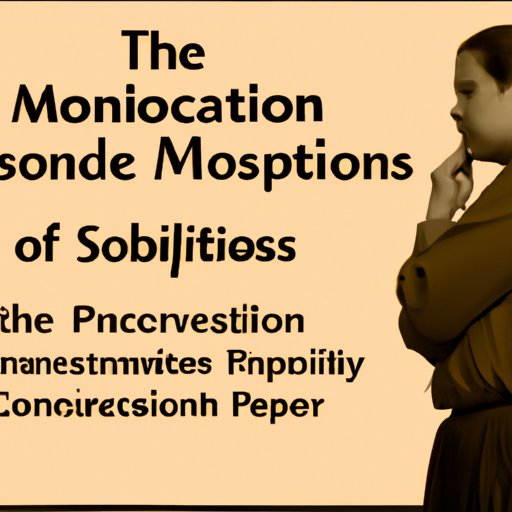Introduction
Mission trips are popular among religious organizations, volunteers, and philanthropists because they offer a unique opportunity to travel and make a difference in the world. But what are mission trips and are they really beneficial? In this article, we’ll explore the pros and cons of mission trips and examine their potential impacts on local communities.
Definition of Mission Trips
Mission trips are short-term excursions that involve volunteers traveling abroad to provide assistance to people in need. The goal of these trips is to provide aid and support to those living in impoverished or developing countries. Mission trips usually focus on providing educational and medical resources, building infrastructure, and engaging in spiritual outreach.
Overview of Pros and Cons of Mission Trips
Mission trips can have both positive and negative effects, depending on the context and approach taken. On the one hand, mission trips can be beneficial by providing access to resources, creating economic development opportunities, and fostering relationships with locals. On the other hand, mission trips can also have unintended consequences, such as cultural misunderstandings, exploitation of resources, and displacement of local workers.
Examining the Pros and Cons of Mission Trips
Exploring the Potential Benefits of Mission Trips
Mission trips can provide a variety of benefits to both volunteers and locals. Here are some of the potential advantages of mission trips:
Personal Growth
For many volunteers, mission trips can be a life-changing experience. By immersing themselves in a new culture and environment, volunteers can gain valuable insight into different perspectives and cultures. They may also develop a better understanding of global issues and become more compassionate towards others.
Spiritual Development
Mission trips often involve spiritual activities, such as prayer groups and Bible study. This can be an invaluable opportunity for volunteers to deepen their faith and explore their spirituality. It can also be a chance to share their beliefs with others and spread the message of their religion.
Building Relationships
Mission trips can provide an opportunity for volunteers to build meaningful relationships with people from different backgrounds. These connections can not only enrich the lives of volunteers, but also create lasting bonds between volunteers and locals that can help bridge cultural divides.
Investigating the Potential Drawbacks of Mission Trips
While mission trips can have many positive outcomes, there are also potential drawbacks that should be considered. Here are some of the potential risks associated with mission trips:
Unintended Consequences
Mission trips can sometimes have unintended consequences, such as disrupting existing social structures and displacing local workers. Volunteers should be aware of these potential risks and take steps to minimize them.
Cultural Misunderstandings
Mission trips can lead to cultural misunderstandings if volunteers are not familiar with local customs and beliefs. Without proper training and preparation, volunteers may inadvertently cause offense or disrespect local traditions.
Over-reliance on the Volunteers
Mission trips can also create an over-reliance on volunteers, as locals may come to rely on them for resources and assistance. This can be detrimental in the long run, as it can hinder locals’ ability to become self-sufficient and create their own solutions to problems.
Exploring Ethical Issues Surrounding Missionary Work
In addition to the potential pros and cons of mission trips, there are also ethical issues that must be addressed. Here are some of the key ethical concerns related to mission trips:
Exploring Issues Related to Power Dynamics
Mission trips can create power imbalances between volunteers and locals. For instance, volunteers may inadvertently displace local workers, impose their religious beliefs, or ignore cultural norms. To avoid these issues, volunteers should strive to empower locals and respect their autonomy.
Investigating the Impact of Financial Support
Financial support from mission trips can also be problematic, as it can create a dependence on donations and lead to exploitation of resources. Furthermore, financial support can create opportunities for corruption and misuse of funds. To prevent these issues, mission trips should strive to promote self-sufficiency and sustainability.

Investigating the Impact of Mission Trips on Local Communities
Mission trips can have both positive and negative impacts on local communities. Here are some of the potential effects of mission trips:
Assessing the Positive Effects of Mission Trips
Mission trips can have a variety of positive effects on local communities. For instance, mission trips can provide access to resources, increase economic development, and enhance education opportunities. In addition, mission trips can create relationships between locals and volunteers, which can foster mutual understanding and respect.
Examining the Potential Negative Impacts of Mission Trips
However, mission trips can also have negative impacts on local communities. For instance, mission trips can lead to the loss of traditional culture, diminish community autonomy, and disrupt existing social structures. To minimize these issues, mission trips should strive to empower locals and encourage self-sufficiency.

Analyzing Unintended Consequences of Missionary Work
Missionary work can also have unintended consequences, such as negative environmental impacts, unforeseen health risks, and long-term displacement of locals. To avoid these issues, mission trips should strive to create sustainable initiatives, address underlying problems, and promote self-sufficiency.

Assessing the Benefits and Challenges of Mission Trips
Overall, mission trips can be beneficial, but they can also have risks and unintended consequences. To assess the effectiveness of mission trips, it’s important to measure short-term versus long-term success, identify sustainable solutions, and consider alternative approaches.
Investigating the Effects of Short-Term Missions on Long-Term Change
To ensure lasting change, mission trips should focus on creating sustainable initiatives, establishing relationships with locals, and training local leaders. Mission trips should also strive to address underlying problems, build capacity for long-term change, and promote self-sufficiency.
Conclusion
Mission trips can be a powerful tool for making a difference in the world, but they can also have unintended consequences. It’s important to consider the potential benefits and drawbacks of mission trips, as well as the ethical and practical implications. Ultimately, mission trips should strive to create lasting change and empower locals, while recognizing the limitations of mission trips.
(Note: Is this article not meeting your expectations? Do you have knowledge or insights to share? Unlock new opportunities and expand your reach by joining our authors team. Click Registration to join us and share your expertise with our readers.)
